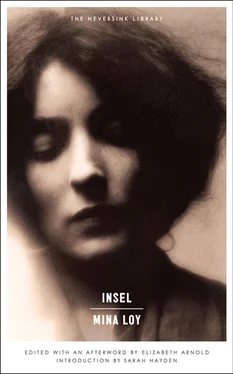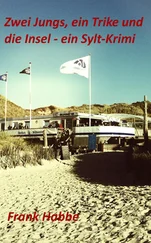After my fitting I invited him to come down to the cafe, intent on buttering him up, on bluffing him into forgetfulness of having allowed me to discover his awful alter ego (in cases of the sane, this alter ego seldom got to work until out of my sight), curious to see if we could part on good terms.
As we stood face to face with nothing in common, the last people on earth likely to become acquainted, I saw him force back his loathing, to accept. Our mutual distaste was noxious on the palate. We each had a pressing engagement for dinner.
I remembered Geronimo taunting me that I was “no psychologist.” “You just walk into a man’s brain, seat yourself comfortably in an armchair to take a look around — afterwards, you write down all you have found there,” he had said. Then what the hell in Insel had I “walked into”? His complaint was true. Nobody saw in him what I saw in him. A kind of consciousness unconscious of its own potency. Even now he was disgusting to the point of revelation.
Insel had also the idea of bluffing a conformative wind-up to our illusory alliance. Resorting to his earlier priggish decency, once we were in the back of the cafe, he hung his head, apparently poisoning it with spurious shame, and mumbled —
“The bad thing about me is that every now and then I come to a blind alley in my life — where somebody has to help me.”
“Now look here, Insel,” I persuaded him with stimulant hypocrisy, “if it were not for that basic something in you — no help would be forthcoming. That which is valuable one does not help , one responds to a cosmic imperative.”
He began to look as if he had been overdoing the shame.
“There was some mention,” I added offhandedly authoritative, “of you busting a thousand francs. You seemed on the defensive. But why? The artist requires color in his life.” This fallacious insight melted Insel’s imitation shame, disclosing the very really wounded face of a child who has long been sulking for being misjudged.
“You told me,” he burst out unhappily, writhing with reproach, “that I put lots of money in the bank.”
So that was it. Insel, with his organic magnifications, had become a foul lout, because he was feeling — cross.
“I didn’t,” I fibbed, striking the suitable note. “I said you hid it under the carpet.” Neither of us had a carpet — we immediately floated off as if on the magical mat of Baghdad, talking on—.
I could feel any word I was saying fit into Insel’s brain appeasing as a missing piece in a jigsaw puzzle.
At once — it was growing late — he clamored for me to stay with him; for that period in which alone he seemed to recognize duration — forever.
Probably I was the collaborative audience to his finest act, the giving off of that calm equation that always reduced me to a hushed respect. He grew in power in his silent “role” in ratio to my reaction. The ultimate self, august in certainty, put forth a soporific bloom that covered his damaged face.
Only now I remarked that on the emergence of this ultimate self in its intangible armor of nobility depended that prolongation of time I so often experienced in the company of Insel, for at present there was no aquarium diffusion, none of that virtually giggling attainment to Nirvana. No x-ray excursion nor any fractionation. His medium-ship concentrated in a sole manifestation. This interference with time.
I could not make out whether the cause was a shift in the relative tempos of a cosmic and microcosmic “pulsation,” whether my instant — the instant of a reductive perceiver — passed through some preponderant magnifier and enlarged, or whether a concept (become gnarled in one’s brain through restriction to the brain’s capacity) unwinding at leisure, was drawing my perception — infinitely soothed — along with it. For again this novel aspect of time seemed, like light, to arrive in rays focusing on the brain at a minimum akin to images on retinas; and the further one projected one’s being to meet it, the broader one found it to be. Anyway, it was useless trying to analyze it. This alone was certain. It was absolutely engrossing to the mind, although nothing brief enough for us to cognize happened in this longer time, which occurred commensurately with the bit of lingering I was wedging in for Insel between contiguous hours in defiance of occupational time.
Rarely, at intervals of aeons, Insel and I would look up at each other in an utter yet somehow communicative impersonality, the final relationship of distinct similars confronting the same phenomenon.
INTIMATELY CONFIDENTIAL ONCE MORE, INSEL was trying to disentangle before me the thousand directions . He had shown them to me previously, in answer to my asking him why he did not work although I had left him materials in my studio.
“So often at dusk I come here to stare at that white canvas,” he had told me dreamingly. “I see all the worlds I could paint upon it. But um Himmels Willen ! Which one? I can create everything. Then what thing? A thousand directions are open to me, to take whichever I decide — I cannot decide.”
I had long ago worn down in contemplation of that multiplicity of direction. How far my mind had traveled; never to come to the beginning of any route. Surely, for Insel it should have been different — starting with the spectral spermatozoa that seeped from his brain through his gardening hands.
The glare in Capoulards Cafe grew dim. Insel’s brain floated up from his head, unraveled, projected its convolutions. They straightened in endless lines across a limitless canvas, a map of imminent direction. On the whole of space were only a few signboards on which grew hands, alive and beckoning.
“Of course,” I was saying, “I don’t know where you are — wherever it is is very far away. And I am just as far away. I have existed before my time.”
“How true,” said Insel.
“Whatever I have found out belongs to a future generation.”
“How true,” said Insel again, devoutly.
“And by the bye,” I commented, “the sentiment of one generation is the neurosis of the next. All that stuff you have of ‘suffering for love’ is the most awful slush.”
“I know — I know,” he agreed with fervor.
— Indefinable lines of cerebral nerve marked on the map of inertia, unrealizable journeys. Along one route, die Irma dissolved to a puddle of serum, to be absorbed by the all-pervasive whiteness. To travel there was difficult; that volatile fungoid lichen outcrept one as one picked one’s way, grew tall until one must turn back.
My former trust in the ripening of Insel’s work had had its foundation in that very “parting of the ways” he told me he had come to, where he turned assured toward something eternally immune to his host of elementals.
It had taken so short a time for this parting of the ways to subdivide into the thousand directions. Yet even now he was rich in postponement. While that commonplace back of a woman watching for signs on his painted firmament turned in anonymous patience to this chart of unarrival.
The curtain of the sky came down and she was not there— “If the painting no longer ‘goes,’ ” Insel surprisingly was ruminating, “I shall do as you do. Write. What a profession. One carries one’s studio about with one. A sheet of paper—”
Because it was only a brain that had been spilled, the blank of orientation faded — the thousand directions withdrew, leaving us at a destination.
Nothingness.
It was not black as night nor white as day, nor gray as death — only a nonexistent irritation as to what purposed inconsequence had led us into the illusion of ever having come into being.
Читать дальше












